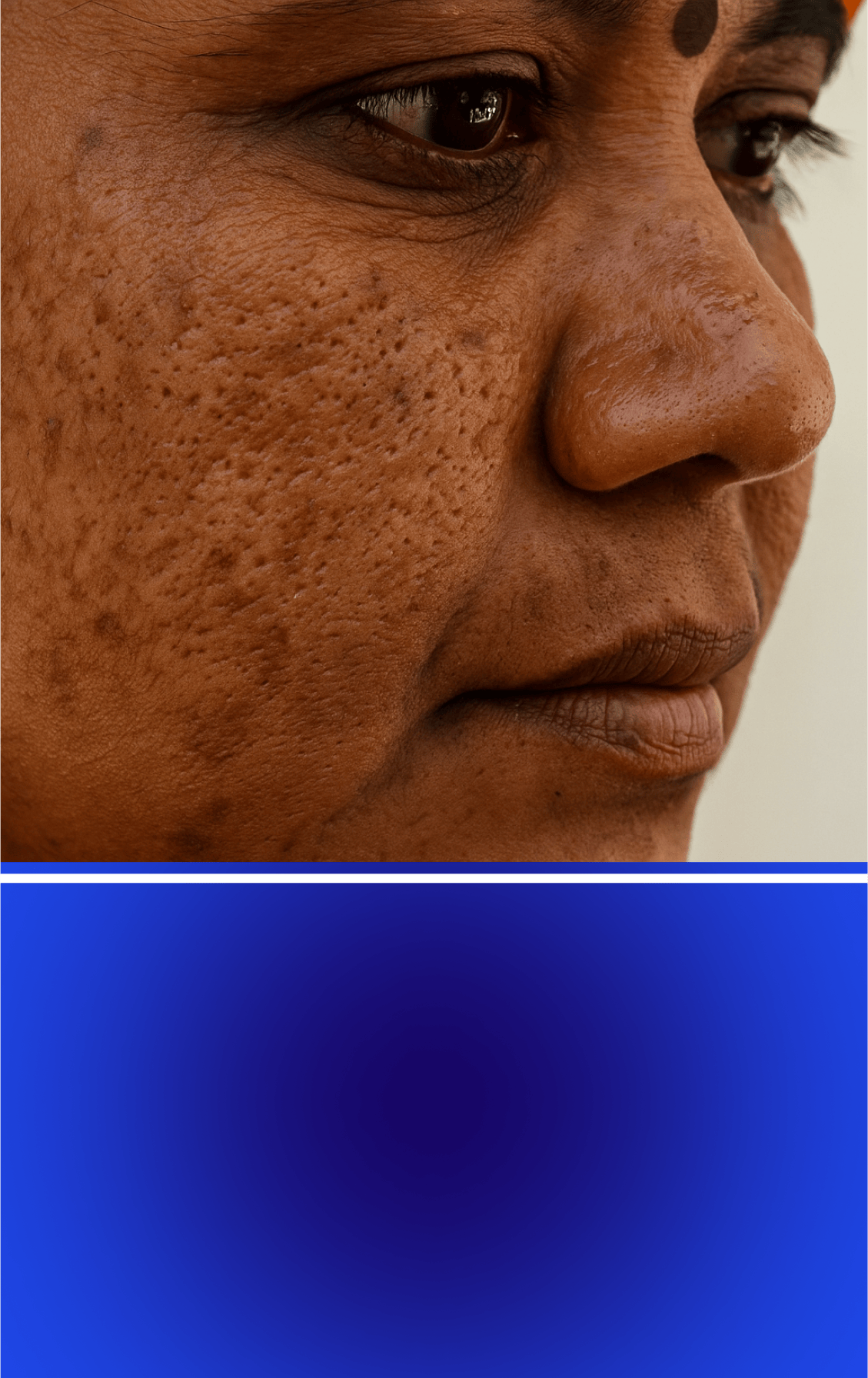Psoriasis is something that can affect how you feel about yourself, your comfort, and even your daily routine. The patches of redness, scaling, and itching often come and go, sometimes flaring up without warning, making the condition unpredictable and difficult to manage on your own. For many people, this brings not only physical discomfort but also emotional stress.
Even though psoriasis is a lifelong condition without a complete cure, the symptoms can be controlled with the proper treatment. If you are searching for the best psoriasis treatment in Chennai, it is important to know the available options, from topical therapies and advanced light treatments to systemic medications tailored to your needs. With timely medical guidance, psoriasis can be managed successfully, helping you achieve healthier skin and improved quality of life.
Key Takeaways
- Psoriasis is an autoimmune skin condition that leads to red, scaly patches and discomfort.
- The psoriasis treatment includes topical creams, phototherapy, medications, and supportive care.
- Early diagnosis helps control flare-ups and prevent complications like psoriatic arthritis.
- Healthy habits, including stress control and proper nutrition, play an important role in supporting psoriasis treatment.
- Consulting a qualified dermatologist ensures safe, effective, and personalised care.
What is Psoriasis?
Psoriasis is an autoimmune condition in which the body’s immune system triggers the rapid buildup of skin cells. Instead of shedding naturally, these excess cells accumulate on the surface of the skin, leading to thickened patches.
This accelerated skin cycle causes visible scaling, redness, and inflammation. For many people, it can cause itching, discomfort, and emotional distress, affecting overall quality of life. Since psoriasis is long-term and tends to flare up in cycles, timely medical care plays a crucial role in managing symptoms and reducing triggers.
Types of Psoriasis
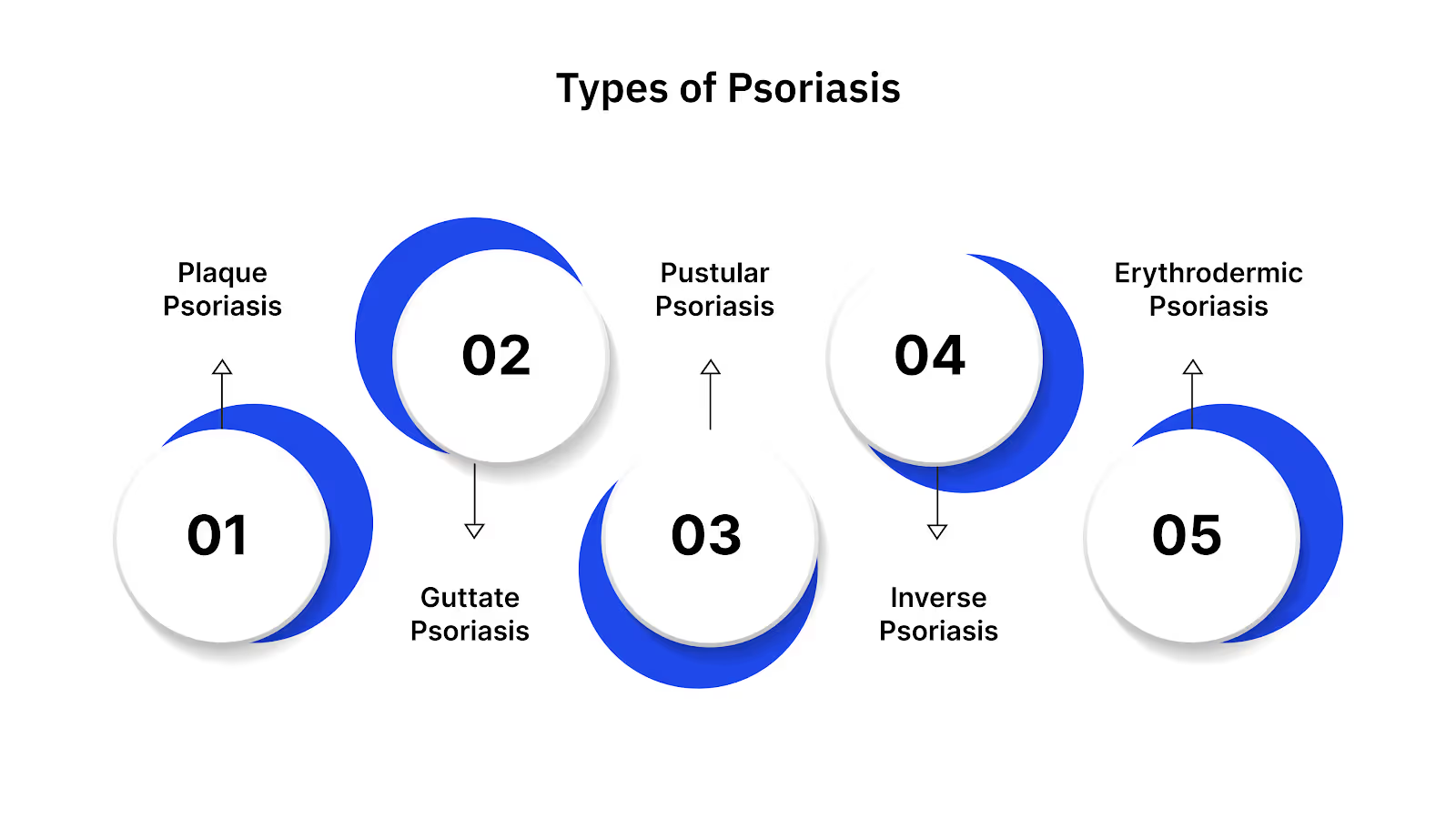
Psoriasis does not appear the same way for everyone. There are several types, each with distinct features:
- Plaque Psoriasis: This is the most common type of psoriasis, where the skin develops raised, red patches topped with silvery-white scales. These plaques usually appear on areas such as the knees, elbows, scalp, and lower back, and they may cause itching, irritation, or discomfort.
- Guttate Psoriasis: Usually triggered by infections such as strep throat, this type appears as small, red, drop-shaped spots on the skin. It is more common in children and young adults.
- Pustular Psoriasis: This type appears as white bumps or blisters filled with non-infectious pus, set against red and inflamed skin. It can affect specific areas such as the hands and feet, or in more severe cases, spread to larger parts of the body.
- Inverse Psoriasis: This type occurs in areas where the skin folds, such as under the breasts, around the groin, or beneath the buttocks. The affected skin appears smooth and red, with minimal scaling, and symptoms can worsen with friction or sweating.
- Erythrodermic Psoriasis: A rare and serious form of psoriasis, it can spread over large areas of the body, leading to widespread redness, scaling, severe itching, and pain. In some cases, it can become life-threatening, requiring immediate medical attention.
While each type of psoriasis has distinct features, there are several common symptoms that most patients may experience.
Also Read: Scalp Fungal Infection: Symptoms, Causes, and Treatment.
Common Symptoms of Psoriasis
Psoriasis can look and feel different depending on its type and severity, but some signs are commonly experienced:
- Inflamed, red, and raised skin patches that may be itchy or sore.
- Whitish-silver scales that build up over these patches due to rapid skin cell turnover.
- Dry, cracked skin that can sometimes bleed, leading to pain and discomfort.
- Thickened or pitted nails, which can sometimes separate from the nail bed.
- Soreness or painful joints are signs that psoriasis may be linked with psoriatic arthritis.
Recognising these symptoms early and seeking professional advice can help manage flare-ups effectively and prevent complications. Now, let’s take a look at the factors that can trigger or worsen psoriasis.
Causes and Triggers of Psoriasis
Psoriasis develops when the immune system overreacts, causing skin cells to grow faster than normal. It can also run in families due to genetic factors. However, having a genetic tendency does not always mean psoriasis will appear. There are certain triggers that usually bring on or worsen the symptoms.
Some of the most common triggers include:
- Emotional or physical stress can trigger psoriasis flare-ups.
- Throat or skin infections sometimes trigger psoriasis, especially in children and young adults.
- Medications, such as beta-blockers, lithium, or antimalarials, can worsen symptoms.
In addition, psoriasis is more likely to flare in people with other health conditions like diabetes, obesity, or heart disease. Lifestyle factors also play an important role. For example:
- Alcohol consumption and smoking can make the condition harder to control.
- Poor sleep and unhealthy habits may increase the frequency of flare-ups.
If you notice persistent symptoms or frequent flare-ups, the next step is to get a proper diagnosis from a qualified dermatologist.
Recommended: Scalp Psoriasis: Symptoms, Causes, and Treatment Options.
Diagnosis of Psoriasis
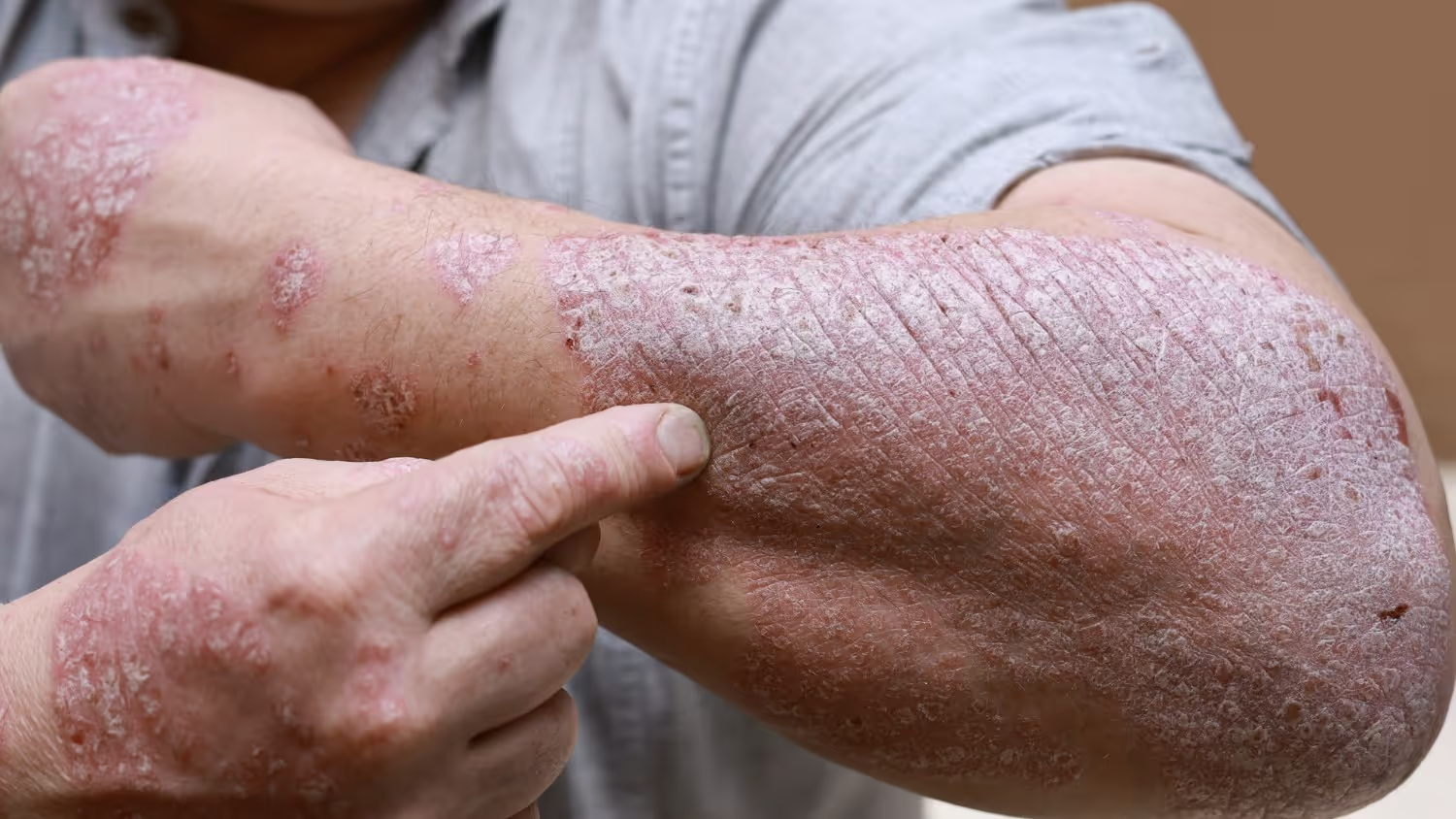
Diagnosing psoriasis begins with a dermatologist examining the skin, nails, and scalp for common signs. Sometimes, additional tests are needed to confirm the condition and rule out similar skin issues.
Key steps in diagnosis may include:
- Physical examination to check the skin patches for redness, scaling, and thickness.
- Review of medical history to understand symptoms, family history, and possible triggers.
- Skin biopsy, where a small sample of the skin is taken for microscopic examination to confirm the diagnosis.
Early consultation with a dermatologist helps control flare-ups and reduces the risk of complications like psoriatic arthritis. Get a professional consultation and accurate diagnosis from MD dermatologist Dr. Janani Sree C M to start your psoriasis treatment in Chennai.
Treatment Options in Chennai
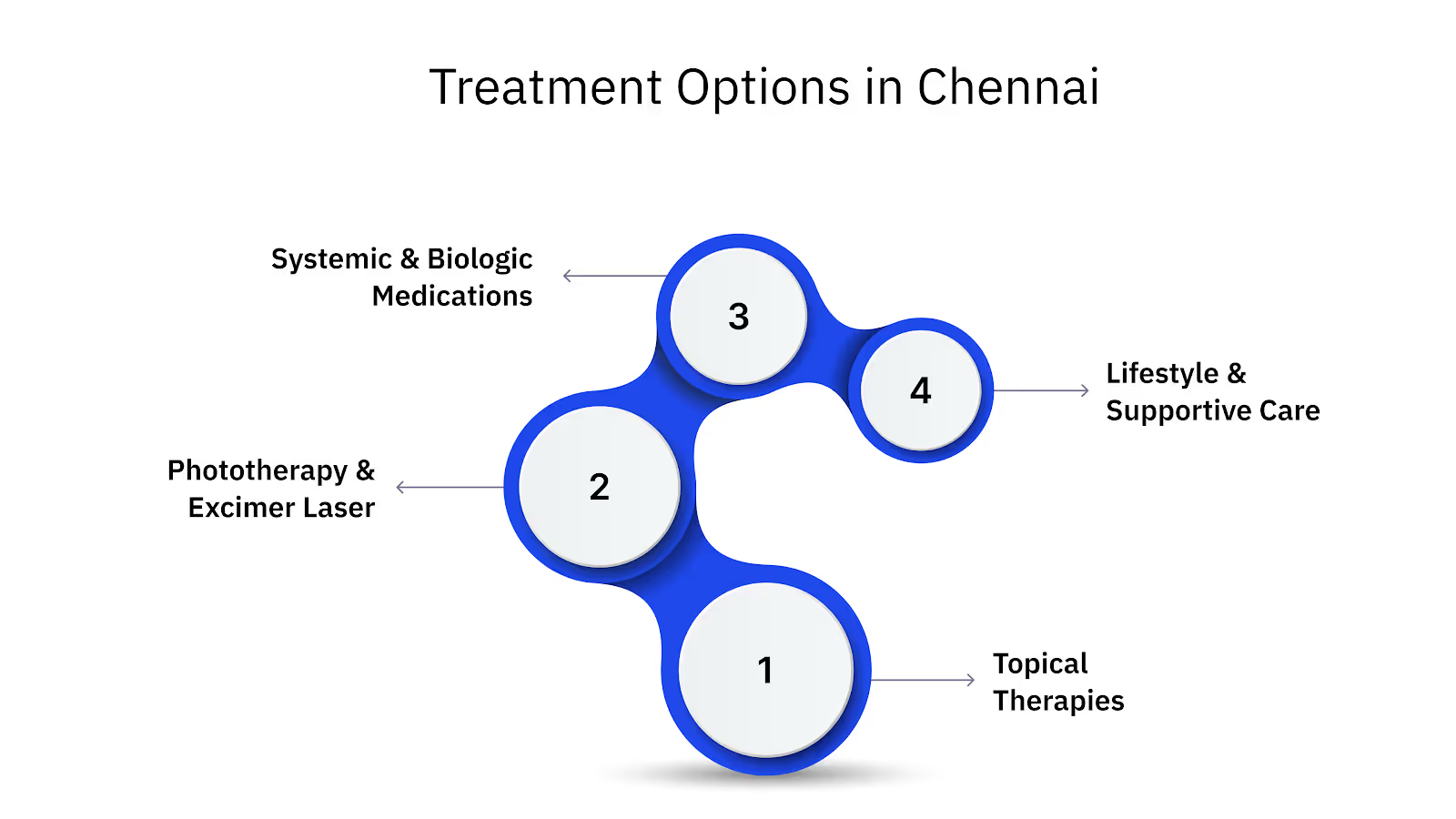
The best psoriasis treatment in Chennai depends on how severe the condition is and how much it affects daily life. Treatment usually combines medical therapies with lifestyle changes to keep symptoms under control. Here are the main options:
1. Topical Therapies
They are often the initial treatment choice for mild cases of psoriasis.
- Creams and ointments with ingredients like corticosteroids or vitamin D help reduce redness, scaling, and itching.
- Medicated shampoos are specially designed for scalp psoriasis, easing flaking and irritation.
These therapies are used directly on the skin and are most effective for treating smaller or localised areas of psoriasis.
2. Phototherapy & Excimer Laser
If creams are not enough, light-based treatments can help.
- Phototherapy treats psoriasis by exposing the skin to controlled ultraviolet (UV) light, which helps slow excessive skin cell growth and eases redness and scaling.
- Excimer laser treatment for psoriasis in Chennai is a more targeted option. The laser focuses only on the affected areas, leaving healthy skin untouched. This makes it very effective for stubborn spots on the scalp, elbows, or knees.
3. Systemic & Biologic Medications
For people with moderate to severe psoriasis that covers large areas or affects joints:
- Systemic medications (taken as tablets or injections) work throughout the body to control the immune system’s overactivity.
- Biologics are advanced medicines designed to block certain immune responses that trigger psoriasis. They can help keep symptoms under control for longer periods compared to traditional treatments.
Because these treatments affect the whole body, they are prescribed only under close medical supervision.
4. Lifestyle & Supportive Care
Medical treatment works best when combined with healthy lifestyle changes.
- Managing stress can prevent sudden flare-ups.
- Maintaining a healthy weight and following a balanced diet can help improve overall skin health and support psoriasis management.
- Avoiding triggers like alcohol, smoking, or irregular sleep helps reduce the chances of symptoms worsening.
With several treatment options available, choosing the right doctor is essential to create a personalised plan and manage psoriasis effectively.
Also Read: Fungal Nail Infection Treatment: Causes, Symptoms, and Solutions.
Finding the Right Dermatologist in Chennai
When looking for the right doctor to treat psoriasis, it is important to consider their medical qualifications, experience with psoriasis cases, patient feedback, and whether they have access to advanced treatment facilities. The right specialist can make a significant difference in how well the condition is managed over time.
At Velantis Dermatology, patients are treated by Dr. Janani Sree C M, an MD dermatologist with expertise in both medical and aesthetic dermatology. Recognised by many as the best dermatologist for psoriasis in Chennai, she provides ethical, evidence-based care focused on long-term management rather than quick fixes.
Here’s how Velantis can help patients with psoriasis:
- Accurate diagnosis and treatment planning by an MD dermatologist.
- Access to a full range of therapies, including topical care, phototherapy, and laser treatment for psoriasis in Chennai.
- Individualised treatment plans tailored to each patient’s symptoms and lifestyle.
- Ethical, patient-first care designed to manage psoriasis effectively over the long term.
Book a consultation today to begin your personalised psoriasis treatment in Chennai.
Conclusion
Managing psoriasis effectively requires professional guidance and a tailored treatment approach. Seeking care from a qualified dermatologist ensures that your symptoms are addressed safely and that long-term management strategies are put in place.
In Chennai, Velantis Dermatology, led by MD dermatologist Dr. Janani Sree C M, provides ethical, evidence-based care for psoriasis. We offer personalised treatment plans designed to control flare-ups, relieve discomfort, and support overall skin health.
Connect with us today for expert guidance and a customised psoriasis treatment plan.
FAQs
Q1. Which treatment is best for psoriasis?
A1: The most effective psoriasis treatment depends on the severity and type of psoriasis you have. For mild cases, topical treatments like corticosteroid creams and vitamin D analogues are commonly used. Moderate to severe cases may require phototherapy or systemic treatments such as oral medications or biologics. It's essential to consult a dermatologist to determine the most suitable treatment for your condition.
Q2. Is there a 100% cure for psoriasis?
A2: Currently, there is no permanent cure for psoriasis. However, various treatments can effectively manage symptoms, reduce flare-ups, and improve quality of life. With appropriate care, many individuals can achieve significant skin clearance and maintain long-term remission.
Q3. What are the common triggers for psoriasis flare-ups?
A3: Psoriasis flare-ups can be triggered by several factors, including stress, infections (like strep throat), skin injuries, certain medications, and environmental factors such as cold weather or smoking. Identifying and managing these triggers can help control the condition.
Q4. How is psoriasis diagnosed?
A4: Psoriasis is typically diagnosed through a physical examination by a dermatologist. In some cases, a skin biopsy may be performed, where a small sample of skin is taken and examined under a microscope to confirm the diagnosis.
Q5. Can lifestyle changes help manage psoriasis?
A5: Yes, adopting a healthy lifestyle can support psoriasis management. Maintaining a balanced diet, managing stress, avoiding smoking and excessive alcohol, and moisturising the skin regularly can help reduce flare-ups and improve overall skin health.
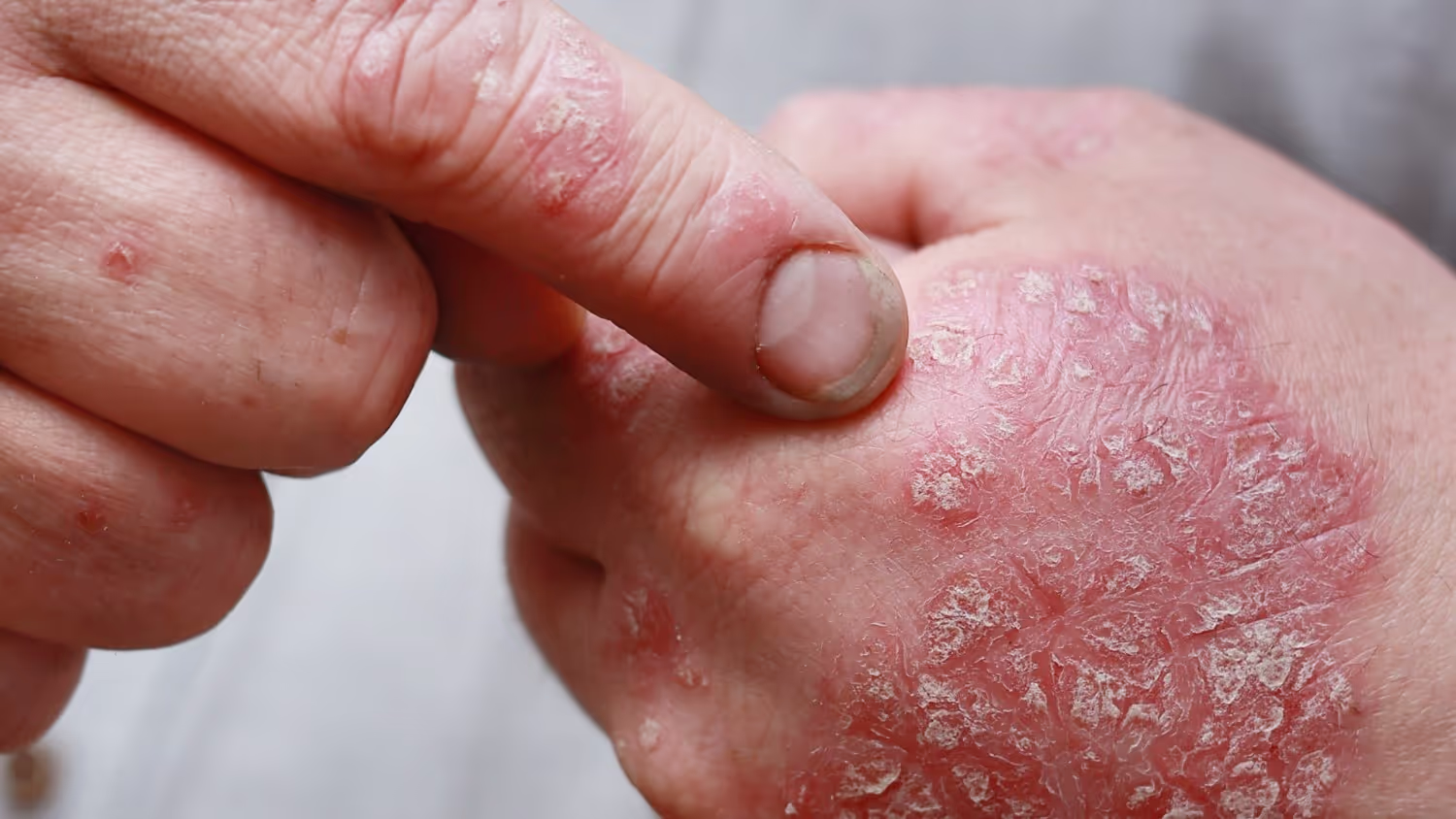

.png)
